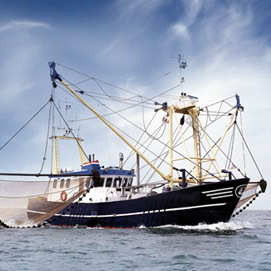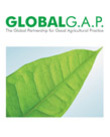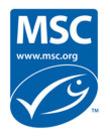Heiploeg Group is actively involved in developments and innovations with regard to furthering sustainability in shrimp fishing, shrimp aquaculture and the processing of shrimp. Some examples of Heiploeg Group's involvement and initiatives in these fields are:
 Sustainable brown shrimp fishing
Sustainable brown shrimp fishing
In 1999 Heiploeg Group brought the concept of MSC certification for the brown shrimp fisheries to the table in the Netherlands, Germany and Denmark. Unfortunately, the first management plan failed during the assessment conducted by an independent MSC-accredited certification organisation. Since the autumn of 2010 Heiploeg Group is very actively involved in this process and can be seen as key driver in this process, formulating most of the ecological management paragraphs. A successful assessment resulting in MSC certification is anticipated in the near future.
Brown shrimp fisheries take place in the coastal waters of the Netherlands, Germany and Denmark. These waters become subject to Natura 2000 EU legislation by which special measures are to be implemented for fisheries. In the course of this process, Heiploeg takes part in the negotiations and implements practical measures such as the encouraging (subsidizing) of ecologically friendly fishing gear (SumWing gear which reduces sea bottom disturbance and decreases fuel consumption) for brown shrimp fishing boats.
Initiating responsible shrimp farming standard
In 2005 Heiploeg Group approached EUREPG.A.P. (nowadays GLOBALG.A.P.) and offered to establish a standard for responsible shrimp farming, incorporating environmental, ecological and social criteria on top of the existing criteria on food safety and animal welfare.
 This standard has been elaborated in the periode 2007-2010 as the general GLOBALG.A.P. aquaculture standard for responsible aquaculture which is the world's largest certification scheme today expressed in tonnage. Since 2011 Heiploeg is Chairman of the GLOBALG.A.P. Technical Committee developing the standard setting aspects.
This standard has been elaborated in the periode 2007-2010 as the general GLOBALG.A.P. aquaculture standard for responsible aquaculture which is the world's largest certification scheme today expressed in tonnage. Since 2011 Heiploeg is Chairman of the GLOBALG.A.P. Technical Committee developing the standard setting aspects.
Contributions to the ASC shrimp farming standard
Before the start of the Aquaculture Stewardship Council (ASC) Heiploeg was one of the partners in a coalition to establish a standard addressing values on ecological sustainability, beyond the level of 'responsible aquaculture' as embedded in the GLOBALG.A.P. framework. Today, Heiploeg is still one of the official ASC supporters and contributors and takes a position in the 'ASC Technical Working Group on Certification and Accreditation'. Currently, some of our GLOBALG.A.P. certified suppliers are encouraged to opt for ASC certification as well.
Enabling a national protocol for chilled organic seafood products
Before the new 719/2009/EC (directives for organic aquaculture and seaweed) amending 834/2007/EC (general regulations for organic production) came into force on July 1, 2010, producing chilled preserved organic seafood products was both legally and technologically impossible. In the course of 2003, the preservation technology developed by Heiploeg without using true preservatives (i.e. sulphite, sorbic acid and benzoic acid) enabled Heiploeg to establish a national protocol in which trade of chilled organic seafood could be commenced, thereby promoting and encouraging this production philosophy. From that respect Heiploeg made a pronounced contribution in this area.
 Initiator and driver of MSC certification of tropical shrimp fisheries (Atlantic Seabob)
Initiator and driver of MSC certification of tropical shrimp fisheries (Atlantic Seabob)
In November 2011 the Suriname Atlantic Seabob fishery was the first-ever tropical shrimp fishery to receive the MSC certificate for sustainable fisheries. Heiploeg Group was the initiator and driving force behind this project. First steps have been taken to achieve MSC certification for the Guyana Seabob fishery as well; we will enter into MSC assessment in 2014.
The first seafood company joining BSCI
Heiploeg was the first seafood importer to become member of BSCI (2010), thereby striving to further better social complicance for factory workers in processing/export plants in risk countries.
Other innovative contributions to further sustainability include, a.o., energy saving measures, safe machines which produce little noise, the use of phosphate-free cleaning agents, biodegradable disinfectants, and far-reaching waste separation (e.g. Heiploeg has its own water purification installations), use of recyclable packaging materials and a safe working environment.